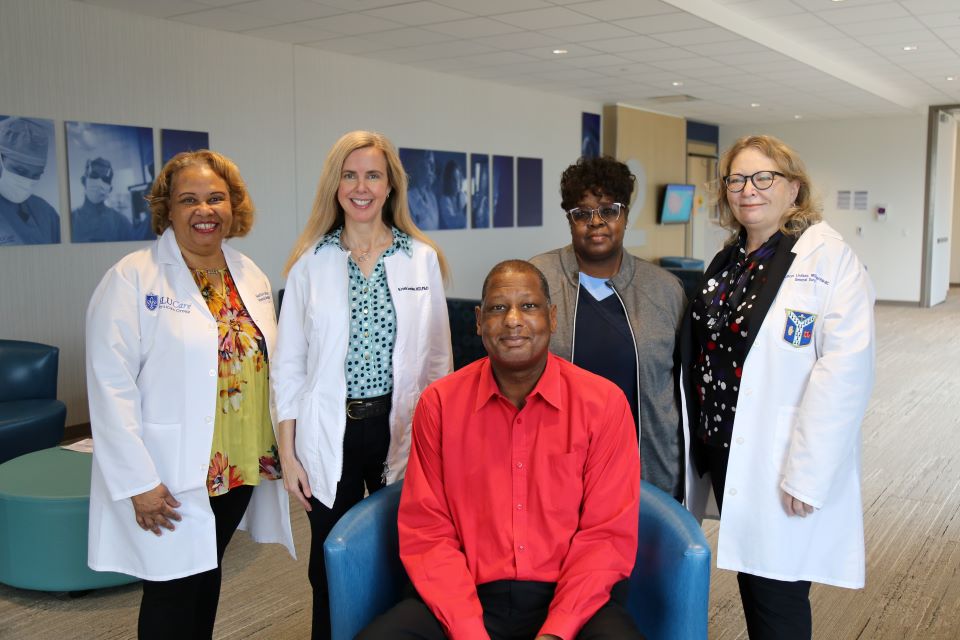SLU Transplant Team Enrolls Participants in National Kidney Study
Bridjes O'Neil
Communications Specialist
bridjes.oneil@slu.edu
314-282-5007
Reserved for members of the media.
ST. LOUIS – African Americans have an increased risk of kidney failure, and new research shows that some of this risk is related to variations in a gene called apolipoprotein L1 (APOL1). It’s a risk Deryl Cunningham, a kidney transplant patient at SSM Health Saint Louis University Hospital, knows all too well.
When Cunningham was diagnosed with stage 2 kidney disease by a doctor in Terre Haute, Indiana, he assumed he had been handed a death sentence. Upon relocating to Edwardsville, Illinois, a local nephrologist mentioned rare instances that kidney disease can be reversed. From there, he began his research.
Cunningham made lifestyle changes and noted a 10% improvement in his kidney function before it deteriorated, to his confusion. He would eventually need a kidney transplant. It was not until he worked with SLUCare doctors at SLU Hospital where Cunningham underwent gene typing that he “got to the bottom of what was really going on,” he said.
“It turns out I had one high-risk gene from each parent which I was unaware of,” Cunningham said. “I wish I would’ve known that information sooner in life.”
“Inheriting two APOL1 renal risk variants, or one from each parent, is associated with an increased risk of kidney failure, and this ‘high risk’ genotype is present in approximately 15% of African Americans,” said SLUCare nephrologist Krista Lentine, M.D., Ph.D., professor of medicine at SLU’s School of Medicine and medical director of living kidney donation at SLU Hospital.
Cunningham knows first-hand the impact of kidney disease on African Americans but added, “we tend to be quiet about things in our community.” His cousin is also a kidney transplant recipient, and he has several acquaintances who also have been impacted by the disease.
After discovering his genotype result from clinical testing, Cunningham is now collaborating with the SLUCare kidney transplant team at SLU Hospital by participating in research to raise awareness about the APOL1 gene.
Lentine and her team are part of a network working to address racial disparities in kidney transplant outcomes. The clinical study, “APOL1 Long-term Kidney Transplantation Outcomes Network (APOLLO)," is a national study supported by the National Institutes of Health (NIH).
“The purpose of APOLLO is to improve the lives of those who donate and receive kidneys by learning more about genetic variations that are found in some people of African descent,” Lentine said.
The study is coordinated by 13 lead centers in the U.S., including SLU Hospital, to engage transplant programs across the country. Eligible participants include living kidney donors, recipients of a kidney transplant from an eligible living or deceased donor with recent African ancestry, and recipients of multiple organs transplanted simultaneously. Researchers seek to enroll at least 2,614 donor-recipient pairs.
APOLLO seeks to quantify how much of the higher risk of transplant failure currently assigned to African American donor race is due to kidney risk variants in the donor. Lentine led a separate article, “Apolipoprotein L1: Role in the Evaluation of Kidney Transplant Donors,” recently published in Current Opinion in Nephrology and Hypertension, that discusses how APOL1 genotyping may improve transplant donor evaluation.
Researchers also are reassessing how APOL1 genotyping might help patients with chronic kidney disease understand and manage their kidney risk. The SLU team led by Dr. Lentine, in partnership with Mid-America Transplant Foundation, launched a pilot study in their St. Louis kidney care clinics offering APOL1 genotyping to African American patients and assessing attitudes about genetic testing and kidney care. To date, Lentine said 130 patients are enrolled in the ongoing local project.
“Working together, we can eliminate health care disparities based on ‘race,’ ensure that disease prevention and management strategies are delivered with optimal cultural sensitivity and improve health and well-being among those of greatest need,” Lentine said.
To learn more about kidney research being conducted at Saint Louis University, call 314-257-3760 or email krista.lentine@health.slu.edu. For more information on this study, please visit ClinicalTrials.gov.
About Saint Louis University School of Medicine
Established in 1836, Saint Louis University School of Medicine has the distinction of awarding the first medical degree west of the Mississippi River. The school educates physicians and biomedical scientists, conducts medical research, and provides health care on a local, national, and international level. Research at the school seeks new cures and treatments in five key areas: infectious disease, liver disease, cancer, heart/lung disease, and aging and brain disorders.
About SLUCare Physician Group
SLUCare Physician Group is the academic medical practice of Saint Louis University, with more than 500 health care providers and 1,200 staff members in hospitals and medical offices throughout the St. Louis region. SLUCare physicians are among the most highly trained in their fields — more than 50 specialties in all — and are national and international experts, renowned for research and innovations in medicine. For more information, visit krista.lentine@health.slu.edu.
About SSM Health
SSM Health is a Catholic, not-for-profit health system serving the comprehensive health needs of communities across the Midwest through a robust and fully integrated health care delivery system. The organization’s more than 40,000 employees and 10,000 providers are committed to providing exceptional health care services and revealing God’s healing presence to everyone they serve.
SSM Health in St. Louis operates 8 hospitals, 6 urgent care locations, 4 SSM Health Express Clinics and more than 40 medical offices in the area. For more information, visit us at ssmhealth.com or find us on Facebook and Twitter.


















